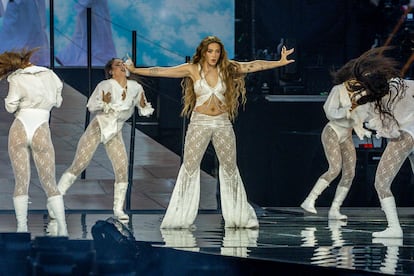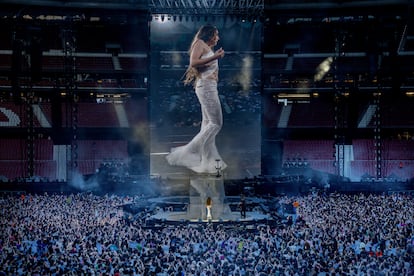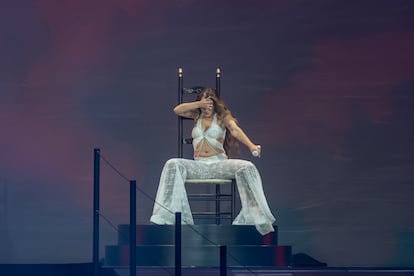Lola Indigo suffers, cries, and overcomes adversity to triumph at the Metropolitano.

Lola Indigo cried last night, two, three, four times, overwhelmed and overwhelmed by emotions at the final chapter of a mission for which she has fought titanally against adversity. It was difficult to keep the grief tempered for a woman who began her musical career in 2017, being the first to be expelled from Amaia and Aitana's Operación Triunfo . Yesterday, she was finally able to show her full potential, which is a lot, in front of 60,000 people at the Metropolitano Stadium. But even on the day of truth, she had to fight hard.
On stage, a driven and ambitious artist on the most important night of her career. In the stands and on the pitch, a predominantly young, party-loving audience, physically involved in what was happening there, and in summer vacation mode. What could possibly go wrong? The technique, of course. The ratty sound of the Metropolitano, the microphone failures of the star and her guests, and the inability to hear the musicians' instruments properly were occasional stumbles that marred the show. But the courage of the star rose above the setbacks.

At the Atlético de Madrid stadium, Lola Índigo confirmed her status as a leading Spanish pop artist and a cultural icon for a vibrant audience that wants to dance, upload concert videos on TikTok, and subscribe to the message of tolerance, diversity, and "don't let them steal your dreams because we are all queens" that the artist imposes in much of her repertoire.
She had performed barely three songs when, overcome with emotion, she could barely manage a "thank you" between tears. Rarely in the recent history of Spanish pop has an artist mustered such tenacity to meet the challenge of filling a stadium. Last night, Lola Indigo's team opened the Excel spreadsheet to crunch the numbers. She probably didn't even break even. Or even lost money. The show at the Metropolitano Stadium was on par with an international production by the reigning pop divas of the moment. The author of "Ya no quiero ná," the song with which she opened the concert, bombarded the audience with a cascade of encouragement, which didn't even cost them the 40 euros (average) paid for each ticket. But the young artist (33 years old) wanted to celebrate what she called "my wedding," a tribute to herself, her fans, the music of this time (urban music), and the ability to overcome setbacks, with those cancellations at the Bernabéu that finally came to fruition at the stadium of our eternal rival. "Fuck, it was hard, huh? But here we are, at the Metropolitano," she shouted, liberated.
This Madrid native, who grew up in Granada and feels Andalusian, drew 60,000 people, almost selling out (about 5,000 were left at the box office). The setup, set in a back garden, consisted of a huge vertical screen, the format imposed by social media, and a catwalk that reached the center of the field with a couple of stages along the way. During the two-and-a-half-hour recital, a few musicians appeared on stage, their instruments barely audible due to a glaring technical error. Of course, the damage can be considered relative, because 80% (more or less) of the sound was pre-recorded. It is what it is; clutching your head over this is like falling into melancholy. Of course, we could see on stage a multitude of dancers, fire, platforms rising and falling, giant silver eggs from which people emerged, and even a car.

The convening power of this scene of young Spanish singers, part of the urban movement, encompassing styles such as hip hop, commercial electronica, and reggaeton, cannot be overlooked. Last week, the Madrid-based rap duo Natos y Waor filled this same venue; yesterday, Lola Indigo, and next week , Granada-born Dellafuente will perform for two days (pay attention: 120,000 people), also at Simeone's house. Never has a Spanish scene sold as many tickets as this one. Quite an achievement.
The concert, bubbling and packed with visual flourishes, was divided into four parts, or eras—that invention used especially by pop divas (Taylor Swift is the champion) to establish the specifics of their ornamental and emotional narrative: it began with The Witch, which we can define as her "I'm the fucking boss" stage of empowerment; it continued with The Girl, where she went back to the time of her first nocturnal flirtations, pink-dyed hair, and playful pop songs with names like Spice Girl; and the third, she called The Dragon, with a futuristic aesthetic and a soundtrack that speaks of power and resilience.
In the middle, Lola, as the audience sang along, dedicated a section to Andalusia. The singer was accompanied in this section by José El Tomate, 26, a guitarist who has lived flamenco from the inside out, as his father goes by the illustrious name of Tomatito, a faithful companion in a thousand battles of Camarón and a legendary guitarist. We know that Tómate already plays with a certain flair despite his youth, but yesterday we barely verified it because his Spanish guitar was inaudible. The musicians and the protagonist took up position on a small stage on the catwalk and there, on wooden chairs, put on a mini flamenco party that included a successful version of Alejandro Sanz's Corazón partió . The Andalusian interlude was good, despite the muddled sound.

During the two-and-a-half-hour concert, the artist performed the most popular songs in her repertoire (Mujer bruja, La niña de la escuela, El tonto, Dragón... ) and was accompanied by three guest vocalists: Tini, Belén Aguilera, and Paulo Londra . Índigo danced with energy, changed her outfit several times, sang well, and rapped with style. The most emotional moment was when she dedicated "Sin Autotune" to a little girl, Triana, "who will be up there," she said, looking at the sky between sobs.
The final act was shocking. The singer ascended from beneath the stage on a throne, dressed in a red bodysuit and over-the-knee boots of the same color, and paraded among her dance troupe of hooded fighters with spears. Thus, she angrily attacked The Queen, the one who says, "You can't be king if you don't have the queen." At the end of the song that closed the night, she said, "I'm so lucky to have experienced this at least once in my life." And she began to cry again. Then she recovered and declared, "Sometimes I make mistakes and I screw up big time... But I never give up." That was clear last night.
EL PAÍS


%3Aformat(jpg)%3Aquality(99)%3Awatermark(f.elconfidencial.com%2Ffile%2Fbae%2Feea%2Ffde%2Fbaeeeafde1b3229287b0c008f7602058.png%2C0%2C275%2C1)%2Ff.elconfidencial.com%2Foriginal%2Fefb%2F511%2F30f%2Fefb51130f44a821b3f6fc071a1ec0532.jpg&w=1280&q=100)


